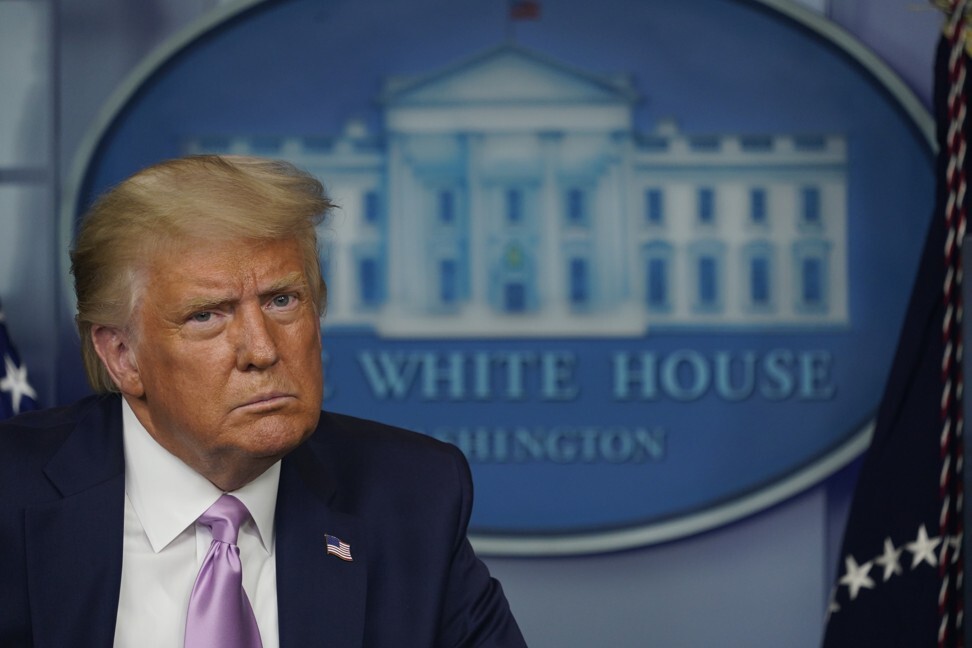
Why Donald Trump vs Joe Biden in US election should keep investors on their toes
- The twists and turns so far of the divisive contest, amid a global pandemic and widespread economic pain, are not yet reflected in buoyant financial markets
- But the result will be consequential, especially given the possibility of the incumbent refusing to concede defeat. The risks should not be so easily dismissed
Yet, America’s presidential election, which is due to be held on November 3, is having scant impact on financial markets for the time being. On Tuesday, the benchmark S&P 500 index, which has surged 51 per cent since its low on March 23, hit an all-time high, underpinned by a ferocious rally in American technology stocks.
Indeed, in Bank of America’s latest fund manager survey, published on Tuesday, respondents ranked the election as the third-biggest “tail risk” in markets, behind a second wave of Covid-19 cases and the US-China trade conflict – threats which themselves have not stopped asset prices powering higher in recent months.

By sowing doubts about the legitimacy of the election, Trump is attempting to dissuade independent voters from opting for Biden.
More worryingly, he is creating an environment in which many voters will question the outcome of the contest. Not only does this make a disputed result more likely, it shows the extent to which Trump – who, as recently as late May, was still tipped to win the election, according to betting markets – fears the former vice-president will beat him.
Taylor Swift to Trump on US postal service: You’re a blatant cheat
A Biden victory, moreover, poses its own risks to markets. Although he is not as left-wing as some of his opponents in the Democratic primaries, he would partially reverse Trump’s corporate tax cuts, bring down drug prices, take a tougher stance towards the energy sector and, potentially, seek to break up America’s technology titans.
All of these policies would be bad for stock markets, and are more likely to be enacted if the Democrats win the presidency and control of both houses of Congress.
On the other hand, a clean sweep for the Democrats would mean more investment in infrastructure, a less confrontational and more multilateralist foreign policy and, crucially, a more predictable and competent policymaking environment.
As JPMorgan rightly observed in a report on July 10, “the most positive outcome [for markets] would be a Biden victory alongside a Republican Senate, which implies fewer market disruptions from foreign policy and no change in tax policy”.

03:59
Joe Biden and Kamala Harris take stage on US presidential campaign as Trump lashes out
The odds of a surge in market volatility in the run-up to the election are high, given that investors themselves are notoriously poor at assessing and pricing political uncertainty. In 2016, traders were convinced there would be a disorderly sell-off if Trump became president, yet the S&P 500 was already rising in the weeks following the election as it became clear Trump’s tax-cutting agenda was a boon for stocks.
This time round, the risks stemming from the election – the most salient of which is the integrity of the ballot – are much greater, increasing the scope for US politics to become a more important driver of markets in the next two months.
China is wise to ease tensions as Trump seeks an election boost
While Biden has a comfortable lead in the polls, it would be a mistake to write off Trump’s chances. Not only has the president narrowed the gap in recent weeks – partly because new Covid-19 cases are trending downward – his base is more passionate about him than Democrats are about Biden. In key battleground states, Biden only has a four-point lead.
Moreover, he is gaffe-prone and could stumble in the presidential debates, a forum in which Trump excels.
Investors have been climbing a wall of worry since the pandemic erupted. A bitterly contested election result in the world’s largest economy would make the climb even steeper.
Nicholas Spiro is a partner at Lauressa Advisory

